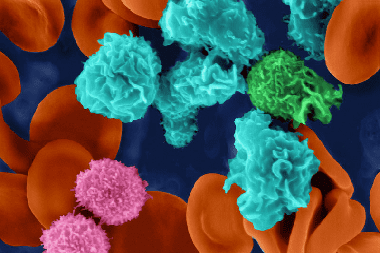Immunology and Allergology >>>> Cytokines are factors of differentiation of immune cells
Cytokines are factors of differentiation of immune cells.

Cytokines, by their nature, are proteins produced by cells of the immune system (often referred to in the literature as "factors"). They are involved in the differentiation of newborn cells of the immune system, endowing them with certain characteristics, which are the source of a variety of immune cells, and also provide intercellular interaction. To make this process easier to understand, you can compare the production of immune cells to a factory. At the first stage, the same blanks of cells leave the conveyor, then at the second stage, with the help of various groups of cytokines, each cell is endowed with special functions and sorted into groups for subsequent participation in immune processes. This is how T-lymphocytes, B-lymphocytes, neutrophils, basophils, eosinophils, monocytes are obtained from the same cells.
Of interest for science is the peculiarity of the effect of a cytokine on a cell, which gives rise to the production of other cytokines by this cell. That is, one cytokine starts a reaction for the production of other cytokines .
Cytokines, depending on their effect on immune cells, are divided into six groups:
- Interferons
- Interleukins
- Colony stimulating factors
- Growth factors
- Chemokines
- Tumor necrosis factors
Interferons are cytokines produced by cells in response to viral infection or other stimuli. These proteins (cytokines) block the reproduction of the virus in other cells and take part in immune cell-to-cell communication.
There are two types of interferons.
The first type (has antiviral and antitumor effects):
interferon alpha
interferon beta
The second type (regulates adaptive immunity and innate resistance):
Interferon gamma
Interferons alpha and beta have a similar mechanism of action, but are produced by different cells.
Interferon alpha is produced by mononuclear phagocytes. From this follows its name - " leukocyte interferon ".
Interferon beta is produced by fibroblasts. Hence its name - " fibroblast interferon ".
Interferons of the first type have their own tasks:
- Enhances the production of interleukins (IL1)
- Reduce the pH-level in the intercellular environment when the temperature rises
- Bind to healthy cells and protect them from viruses
- Capable of inhibiting cell proliferation (proliferation) by blocking amino acid synthesis
- In conjunction with natural killer cells, induce or suppress (depending on the situation) the formation of antigens
Interferon-gamma is produced by T-lymphocytes and natural killer cells. Bears the name - " immune interferon "
Interferon of the second type also has tasks:
- Activates T-lymphocytes, B-lymphocytes, macrophages, neutrophils,
- Inhibits the proliferation of thymocytes,
- Strengthens cellular immunity and autoimmunity,
- Regulates apoptosis of normal and infected cells.
Interleukins (abbreviated as IL) are cytokines that regulate the interaction between leukocytes. Science has identified 27 interleukins.Colony-stimulating factors are cytokines that regulate the division and differentiation of bone marrow stem cells and precursors of blood cells. These cytokines are responsible for the ability of lymphocytes to clone, and are also able to stimulate the functionality of cells outside the bone marrow.
Growth factors - regulate the growth, differentiation and functionality of cells in various tissues
The following growth factors have been discovered to date:
- transforming growth factors alpha and beta
- epidermal growth factor
- fibroblast growth factor
- platelet growth factor
- nerve growth factor
- insulin-like growth factor
- heparin-binding growth factor
- endothelial cell growth factor
The most studied are the functions of transforming growth factor beta. It is responsible for suppressing the growth and activity of T-lymphocytes, suppresses some functions of macrophages, neutrophils, B-lymphocytes. Although this factor belongs to growth factors, in fact, it participates in the reverse processes, that is, it suppresses the immune response (suppresses the functions of cells involved in immune defense) when the infection is eliminated and there is no longer a need for immune cells to work. It is under the influence of this factor that collagen synthesis and the production of IgA immunoglobulin increase during wound healing, and memory cells are generated.
Chemokines are low molecular weight cytokines. Their main function is to attract leukocytes from the bloodstream to the site of inflammation, as well as to regulate the mobility of leukocytes.
Tumor necrosis factors (TNF for short) are two types of cytokines (TNF-alpha and TNF-beta). The results of their action: the development of cachexia (an extreme degree of depletion of the body as a result slows down the activity of an enzyme that promotes the accumulation of fat in the body); the development of toxic shock; inhibition of apoptosis (cell death) of cells of the immune system, inducing apoptosis of tumor and other cells; platelet activation and wound healing; inhibition of angiogenesis (proliferation of blood vessels) and fibrogenesis (degeneration of tissue into connective tissue), granulomatosis (formation of granulomas - proliferation and transformation of phagocytes) and many other results.

Read

Read



























